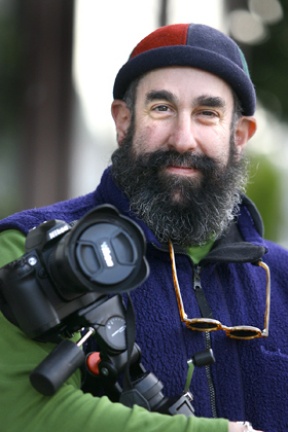Black-and-white photographer David Cohen looks for shadow and nuance.
David Cohen invites viewers to step into a picture and onto a path.
His images of quiet trails and empty beaches, currently on display at the Streamliner Diner, issue an implicit invitation: Come, take a journey, see what you’ll find.
“A lot of the landscape work that I do is a way to take people into an environment where I have been,” Cohen said. “They may never be in that environment, but if they saw the photograph or owned the photograph, they could imagine themselves there.”
Using tools available to digital photographers, Cohen converts color to black and white, and sharpens layers that might include such compositional elements as clouds, snow, or the edge of a road to enhance parts of the photograph.
Most of the 10 works feature dynamic compositions bisected by a strong diagonal – often a road or pathway that recedes into the distance.
Cohen says he harnesses technique to make visible to the viewer emotions he experienced at a particular site: Process is in service to content and every photograph is the record of a unique story.
He traces one especially striking image, titled “Bicycle Path” to a particular bicycle ride with his 5-year-old son when the family visited The Netherlands in 2005. Father and son were both struck by a particular vantage point on a bicycle path that curved out of sight behind a bluff.
The composition and balance tell a story, Cohen says, about “this mystery of what’s out there, behind there. Is it the ocean that you see when you turn the corner? Is it another set of rolling dunes? You just don’t know.”
Looking for what is around the next bend has shaped Cohen’s personal journey, an odyssey that began in Pittsburgh, where Cohen grew up the middle child of three brothers. Cohen admits that he often got in trouble for teaching his older and younger brother “behavior that a parent doesn’t want to see in their teens.”
For the spirited youngster, photography would prove the route to parental approval. “I started to have an affinity, a passion, for the lithographs and etchings my parents collected,” he said.
“As I began to take picture and began developing and printing in my parents house, this was something that I wanted to replicate,” he said, “because I knew that they loved those artists and I wanted to show them that I could do something.”
Cohen soon pointed his Minolta Rangefinder at landscapes, because he found it frustrating to get human subjects to sit still. Influenced by the black-and-white prints on display in the family home, Cohen was drawn to grayscale photos, converting the palette of the world into shadows, midtones and highlights.
With digital processing Cohen mirrors the zone system that film-based photographers used, taking light meter readings at various places on the site to sharpen a certain portion of the image, to isolate and emphasize that part of the photo.
Cohen’s path to a fine art career has had some bends and curves. For years, he made a living building sets for East Coast theaters.
After marrying a Netherlands native, he spent several years in Europe. In 1989, the couple moved to Seattle, and Cohen took an entry-level job with Adobe Systems, working his way to his current position as a senior software product manager.
The family moved to Bainbridge in 1993. Rather than investing in a big house, the Cohens have kept travel a priority, affording the artist a chance to develop his eye for landscape.
Now, with his first one-person exhibit, Cohen hopes to bring images of the places he loves to a wider audience.
“It’s an opportunity to stand back and show something visually that meant something to me,” Cohen said. “When I look at these landscapes and I’m standing there, it’s a different world from my very hectic world as a software product manager.
“To have this moment on a beach, in the mountains, in the snow, in a sense, it’s my quiet time.”


